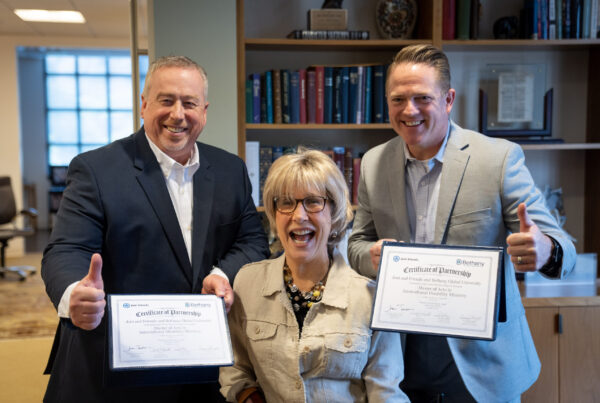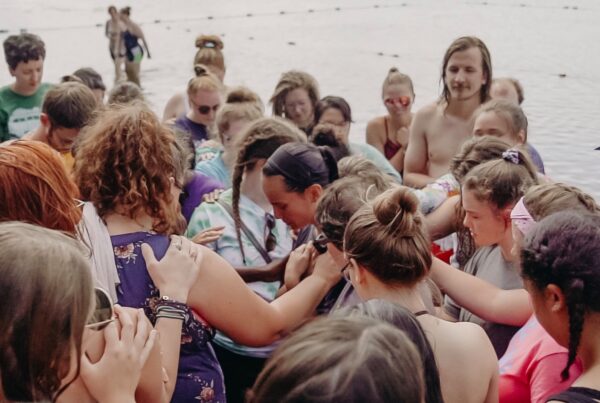Leaders are an essential part of society. The vision, influence, servanthood and spirituality that a leader carries, holds the power to shape communities, nations and the world. With BGU student president elections coming up, leadership is a topic in the mind of our community. It is a time to think about leadership and it’s affect at our missionary school.
Here is a look into how four of our BGU students approach leadership:
What does leadership mean to you?
David G: Leadership to me, is anyone who has an influence on someone else’s life, whether they realize it or not. An ideal leader is someone who leverages their influence for the betterment of other people and/or the organization they are a part of. A Christian leader is someone who does these things, but also strives to be more like Jesus: someone who is humble, full of integrity, loyal, confident, and a servant.
Sydney P: The best way to approach leadership is through servant leadership. A leader should not ask others to do something they wouldn’t be willing to do. A Christian leader is someone who seeks to walk as Jesus did and strives to walk their life as He did. When I lead, I pray that people will see Christ in me. Leadership means serving alongside those you are leading. A leader is also someone who calls out the gifts and abilities of others, they allow others to lead and thrive. They create an environment where others can grow in their leadership. A leader is humble and seeks advice from leaders above them. They realize that they need accountability, they show the humility to embrace it. A leader is someone who is willing to accept constructive criticism, and continue to grow.
Caleb B: Leadership first and foremost is the opportunity to serve others, and through word and action bring them closer to God and who they are supposed to be in service to Him. When I think about leadership opportunities in the past, or any that I am considering now, I remember Christ called for us to love one another as He loved us, and that the greatest thing I can do for my community is to lay down my life; this means that a leader takes every opportunity to encourage and build up his brothers and sisters, but will also be seen doing the small things first before they are trusted with the big. In the end, they are the ones who are willing to go above and beyond, even at personal cost, to make sure that each person within their reach is made to feel valued, elevated to their highest potential, and shown a Christ-like example of living.
Nick D: Leadership to me is simply guiding and serving. I think that it is very important for a leader in any position to have a servant attitude, whether it is leadership in something like student government or a leadership position in everyday life. In a student government position, it is important to have a heart for the entire student body, and a vision of where you want things to go. An ideal leader to me is someone who is clear and honest, someone who is seeking mutual growth, they have a desire to grow just as much as others. Leadership in a large group of people is the ability to clearly communicate what is going on to everyone, and going the extra mile as a leader to help everyone feel appreciated. As a leader, it is important to strive to be more like Jesus, and sometimes as a leader, you have to acknowledge that you can’t always make a decision that makes everyone happy; striving to glorify God in those decisions is the most important thing.
In community, how would you, or how do you display servant leadership?
David G: I personally try to always be open to everybody; I try to remain approachable. Not only do I try to show the behavior of a servant leader in community through communication and meeting needs, but I also serve the community by casting vision, and by practical ways like fulfilling my responsibilities and helping the community run well. If I see someone hurting or in pain, I stop what I am doing to help them.
Sydney P: By giving time to others, even when I am busy, and being very intentional when doing this. Another way is by praying for others, not just saying you’re going to do it, but carrying it out. Helping people out when they are in need, whether it is with homework or questions about anything, and being aware of surroundings, knowing when there is a need that needs to be met and meeting it, even when it is something small like picking up a kitchen tray or holding a door open for someone.
Caleb B: Engaging every person you are able to reach, looking past any barriers, social or otherwise, in order to become more aware of every member of the body of Christ. This allows a greater sense of direction and decision making concerning the use of everyone’s skills, talents and giftings, as well as a deeper understanding of how each person can be encouraged to use their abilities for God, and in turn become servant leaders themselves.
Nick D: In a community, I think it is very important to do the small things. We have an amazing community, and there is so many people that are willing to step up and serve and it’s just a blessing to have this community, and it is a very humbling experience to be here. Doing simple things like opening the door and saying good morning become so important, and just placing others above yourself. It is important that when you get up in the morning, you are always willing to love others and put others above yourself, especially when you have a lot of responsibilities. A leader knows when it is important to discard a schedule to recognize the importance of your relationships to those in your community, whether it is leaders above you or other students. It is important to place others above yourself in a day to day basis, and being aware of things around you, for example, if you see that someone is uncomfortable, being willing to step up and help them out.
How should we make sure we put the Holy Spirit first when we lead?
David G: It starts with personal devotion, personal intimacy with the Lord because it is at that time of prayer and meditation with Him that you renew your mind. Your thoughts are slowly transformed and made more like God’s thoughts. They are more aligned with what God says and scripture says. It starts at surrender. If a person is not surrendered to the Lord and spending time with Him in intimacy, they would in a sense be able to lead with the Holy Spirit, but it will be hard for them to clearly listen to the Holy Spirit at all times.
Sydney P: Prayer, definitely prayer. Seek the Lord in how he is moving in different ways, and where the Holy Spirit is moving before making a decision or action; and definitely knowing the word and God’s character. Being aware of confirmation from the Holy Spirit, through how He speaks to us through individuals or other means.
Caleb B: In all decisions, a certain quietness and receptivity to what the Spirit has to say is essential. A leader does not first seek what they can do but opens the eyes to what God is doing around them. By doing this, they are able to be shown how they can serve the Lord and work with the Spirit through His design, which in turn becomes the ultimate action a leader can take. Only through humble observation, steadfast patience, and a true desire of the heart to give the Holy Spirit room to move, is a servant leader capable of carrying out God’s will.
Nick D: One awesome thing I’ve learned from Bethany Global University President, Dave Hasz, is having the ability to hear and recognize the voice of the Holy Spirit. As you read the book of Acts, you see so much. The apostles can do that, they can hear the Holy Spirit clearly and are very in tune with Him. Not only recognizing Him but having the boldness to step out and do what the Holy Spirit is calling them to do. I think the more and more that you listen to the Holy Spirit, the more He will show you fruits of what He is doing in our lives.
As a leader, how would you make sure that no one is left behind?
David G: From experience, it’s just that I really have to take more time to spend with people if they are indeed being left behind or not being developed. Another thing is also spreading awareness to the community about the issue so that they feel empowered to help, and the third thing is that I try to develop the one who is falling behind by trying to figure out the reasons why they are falling behind and seeing if there’s any way I can help and if there is any kind of healing that the Holy Spirit can provide. It’s a blend of asking the group to slow down, and seeing if I can help the individual speed up.
Sydney P: In the past, I’ve found myself around people who are unheard. I have had the chance to see their different giftings, learn about them, and where to use them. A good idea is to write down a list of people and the different roles they are strong in. It’s also a good idea to always bring in a new view of things and to carry out events that include the interests of different people.
Caleb B: I can only do this by pursuing a legitimate awareness of who I am in community with. When I ask myself the question, “why am I here?” I realize it is to pursue the character of God and discover which way I can serve Him. In this pursuit, I am shown that I must desire to know each and every one of His children, by eating with them, inviting them into worship, partnering with them in their pursuits, and endeavoring to strive with them in their struggles. I come to grasp a greater awareness of their character, and who God has made them to be. This gives me greater knowledge of the body I have been placed in, and the ability to serve others on a deeper level.
Nick D: The easiest thing that we can do in that aspect is prayer. Praying for the student body as a whole, and for individuals. Some initiative that I can take, is to uplift and strengthen others. What I mean by that is delegating and passing on responsibilities to those around me. By doing this, you can create a web of community that brings people together, by bonding and strengthening the community through activities, responsibilities, and fellowship. For example, for an event that I was in charge of, we knew we wanted to get as many people as wanted involved, but I also knew that I didn’t know everybody as a whole. By giving responsibilities to others, you let them know that they are needed and desired. If I give them a responsibility, they can reach out to their group of friends, rather than I holding onto all the responsibility and ultimately trying to do everything myself. It’s like a basketball game, I can try to shoot and score alone, or I work together with my teammates and use their strengths.
How does a leader make sure they are continuing to grow?
David G: Always pursue people, listen to podcasts, read manuals and books, go to seminars, and listen to advice from the great leaders around us. A leader grows by pursuing those things, but spending personal time with the Lord that is the most important thing, anything you know about leadership can be useless without that.
Sydney P: I love learning and growing. Ways I continue to grow are through getting feedback from others and being open to it, memorizing the word, receiving advise from leaders, teachers, authority figures and my peers.
Caleb B: A leader continues to grow by constant sustenance from the Lord. I would say, going to God and submitting your will to Him. After that comes, pursuing your character in the Lord, seeking mentorship from people whose character shows a true pursuance of God. Also, by continually seeking out situations which will stretch and mold an individual towards Godliness. This can consist of continually volunteering ones time to doing the things that others are not willing to do, it can consist of pursuing challenges which require you to rely on the Lord, and placing oneself in a situation that you know the Spirit must be called upon to get through, by that I do not mean to say that a leader is supposed to test the Spirit, but that they must not shy away from waiting expectantly on Him to come through and provide them with everything they need to complete the tasks that God has placed in their lives. From this kind of reliance, every aspect of a leader’s growth can be God-given and preserved by the Holy Spirit.
Nick D: one very important thing is mentorship. Even a pastor of a church and other leaders need a mentor so that they are continuing to grow. Staying humble and knowing that you don’t know everything is also very important. You will always need more and more to learn, and acknowledging that is important. Another really important thing is recognizing that everybody has something to teach you. Everybody on this campus has something to teach me, and seeking people out in humility helps growth. Pursuing Jesus with all your heart, and continuing to give up your days in every way to Him, understanding that his knowledge and wisdom is infinite and understanding that he will always be able to give me more and more when we seek Him out. I think also through experiences and through reality checks; very often is it that we need humbling reality checks to give us a reality check…I think we refer to that as, “the hard way”. This gives us a chance to learn from our failures, and that can be used because if you haven’t failed as a leader, at some point, you are going to.
A leader is a role model, how should a leader carry themselves to be a positive one?
David G: Carry yourself with confidence, joy, and being an active servant of the people they lead is very important for displaying a model. Jesus displayed the perfect servant model for us. He wasn’t passive about it, He didn’t just say He was a servant and didn’t do anything about it. He followed up with actions. We should engage in behavior that shows our servant heart to one another.
Sydney P: Being deeply rooted in the word and the Lord, and allowing the Lord to affect us. Realizing that the Lord calls us to be individuals of integrity, to love sacrificially, and to be genuine about our faith and words. Also, believing that the Lord is good, despite circumstances. Words are important as well; they carry power. They bring life or death. As leaders, are our words glorifying the Lord and edifying believers? Or are they pulling others away from the Lord and carrying negativity?
Caleb B: Within a Christian community, a leader is only effective if they reflect Christ. At the end of the day, are they able to say, “everything you have seen me doing, is what I’ve seen the Father doing, and everything you have heard me say, is what the Father has said”? Our ability as role models should only come from modeling ourselves after Christ, who sets the ultimate example in the word of God. What people should recognize in them are the fruits of the Spirit, and others should be reminded of Christ on a daily interaction with them.
Nick D: With character that resembles Christ-like attributes. Walking out in humility by putting others above ourselves and recognizing the importance of everyone around you. Also, one of my favorite verses is Joshua 1:9, “Be strong and courageous. Do not be terrified; do not be discouraged, for the Lord your God will be with you wherever you go.” So, avoiding fear, and walking in the confidence of the Lord is a big thing, because He is with us everywhere. Boldness with humility together is a key attribute of how Jesus walked out His life; in the desert and on the cross are some ways we can see these aspects. Integrity is the third thing, it is very important for a leader to have integrity, it’s important to be able to trust a leader’s words. These are things I’ve been trying to display this year. I hope I have been able to display that, and I hope that as part of the community, people have the confidence to call me out on that if I haven’t.
Through outreaches, Practical Training (PT), Global Internship, and classes like Power of the Cross (POC), and Evangelism Discipleship and Community (EDC), BGU seeks to foster not only valuable missionary training but develop substantial servant leaders who will take the church to where it’s not.




